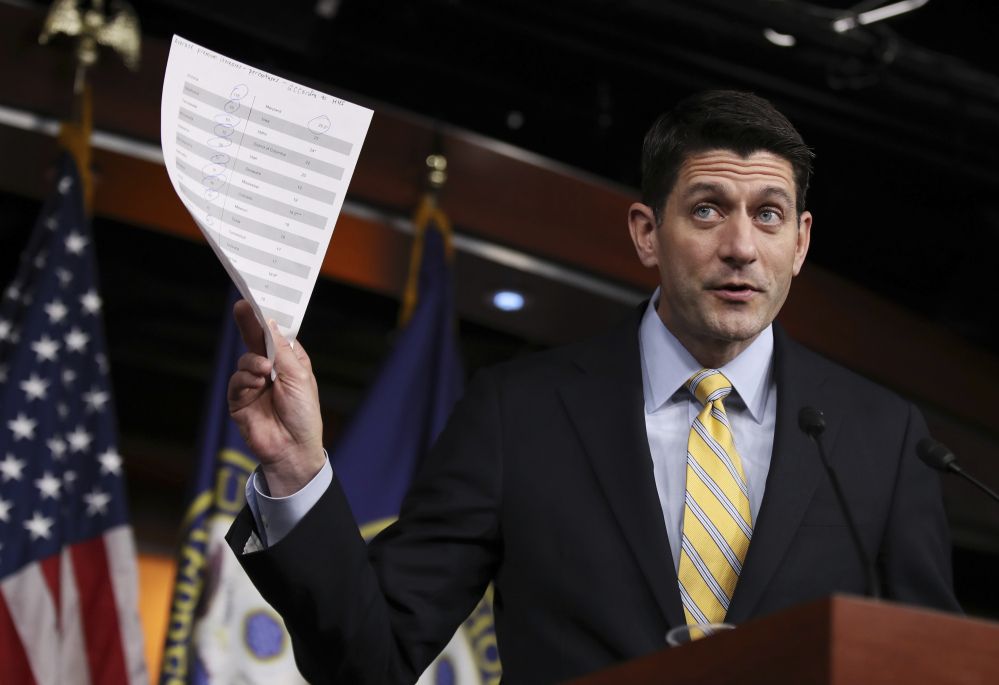WASHINGTON — Lawmakers will act this year on bills not simply repealing President Obama’s health care law but replacing it as well, House Speaker Paul Ryan said Thursday.
The remarks by Ryan, R-Wis., suggested a faster schedule than some had expected on reshaping the nation’s health care system. While Republicans have said they plan to vote this year on dismantling Obama’s law, Ryan went a step further, saying they also would write legislation to replace it in 2017.
It won’t be easy. Despite unifying for years behind the notion of dismantling Obama’s 2010 law, Republicans have yet to rally behind a plan for replacing it, stymied by divisions over how to do it and pay for the changes.
“Our legislating on Obamacare, our repealing and replacing and transitioning, the legislating will occur this year,” Ryan told reporters, using a nickname for the law.
Ryan spokeswoman AshLee Strong said by “legislating,” Ryan meant lawmakers will write legislation and vote on it.
With Donald Trump set to become president on Jan. 20, Republicans running Congress now face the political imperative to deliver on their oft-repeated promises to erase and replace the health law. Democrats, who helped Obama enact the law without any Republican votes, are defending Obama’s overhaul but are outnumbered in the House and Senate.
No. 2 Senate Republican leader John Cornyn of Texas said writing a new health care law would be a top priority in his chamber but stopped short of saying senators would complete that this year.
“The Senate operating at warp speed is still nothing compared to what the House can do,” he said in a brief interview.
Republican Ohio Gov. John Kasich, whose state is covering hundreds of thousands of additional people under the health care law’s Medicaid expansion, expressed concerns to reporters in Cleveland about whether Congress would follow repeal with a replacement.
“What are we going to tell 700,000 people, you don’t get health care anymore?” said Kasich, who challenged Trump for his party’s presidential nomination. “It’s always easy to repeal, but the key is, what are you going to put in its place?”
The law created marketplaces where consumers can buy coverage and provided subsidies to help people afford premiums, expanded Medicaid for lower-earning people and set requirements for the types of care that insurers must cover. Overall, it’s provided coverage for 20 million additional people.
Republicans want to abolish the law’s penalties for individuals who don’t buy policies and for some larger businesses that don’t cover employees. They want to ease federal coverage requirements and have proposed providing tax credits to help people afford coverage.
Since the new Congress convened this week, Republicans have taken initial, procedural steps toward voiding the law.
Lawmakers hope to finish a budget next week that would prevent Democrats from using a filibuster to block a future bill repealing the health law. That same budget would give congressional committees until late February to write legislation annulling much of the overhaul.
On a party-line 52-48 vote Thursday, Republicans defeated a Democratic proposal that would have allowed a filibuster – which requires 60 votes to end – of any bill repealing the health care law unless it would also fully replace it.
Republicans are discussing delaying the date when repeal would take effect, for perhaps several years, to allow time to craft replacement legislation.
Send questions/comments to the editors.



Success. Please wait for the page to reload. If the page does not reload within 5 seconds, please refresh the page.
Enter your email and password to access comments.
Hi, to comment on stories you must . This profile is in addition to your subscription and website login.
Already have a commenting profile? .
Invalid username/password.
Please check your email to confirm and complete your registration.
Only subscribers are eligible to post comments. Please subscribe or login first for digital access. Here’s why.
Use the form below to reset your password. When you've submitted your account email, we will send an email with a reset code.